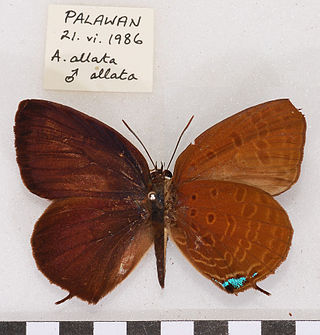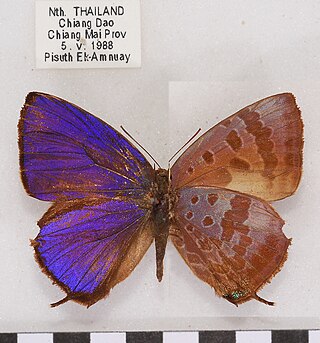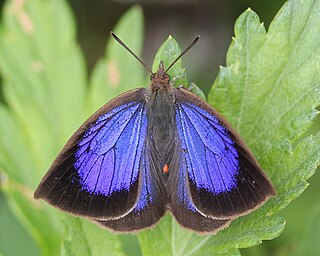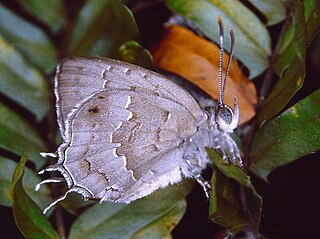
The superfamily Papilionoidea contains all the butterflies except for the moth-like Hedyloidea.

Lycaenidae is the second-largest family of butterflies, with over 6,000 species worldwide, whose members are also called gossamer-winged butterflies. They constitute about 30% of the known butterfly species.

Riodinidae is the family of metalmark butterflies. The common name "metalmarks" refers to the small, metallic-looking spots commonly found on their wings. The 1532 species are placed in 146 genera. Although mostly Neotropical in distribution, the family is also represented both in the Nearctic, Palearctic, Australasian (Dicallaneura), Afrotropic, and Indomalayan realms.

The chalkhill blue is a butterfly in the family Lycaenidae. It is a small butterfly that can be found throughout the Palearctic realm, where it occurs primarily in grasslands rich in chalk. Males have a pale blue colour, while females are dark brown. Both have chequered fringes around their wings.

Arhopala allata suffusa, the Tytler's rosy oakblue, sometimes placed in Amblypodia, is a small subspecies of butterfly found in India that belongs to the lycaenids or blues family.

Arhopala silhetensis, the Sylhet oakblue, is a small butterfly found in India that belongs to the lycaenids or blues family. The species was first described by William Chapman Hewitson in 1862.
Arhopala aedias yendava, the Singapore oakblue, is a subspecies of small butterfly found in India that belongs to the lycaenids or blues family.

Arhopala agaba, the purple-glazed oakblue, is a small butterfly found from India to Thailand, Langkawi, Indochina, Peninsular Malaysia to the Philippines and Sumatra that belongs to the lycaenids or blues family. The species was first described by William Chapman Hewitson in 1862.
Arhopala alax, the silky oakblue, is a small butterfly found in India that belongs to the lycaenids or blues family.

Arhopala is a very large genus of gossamer-winged butterflies (Lycaenidae). They are the type genus of the tribe Arhopalini. In the relatively wide circumscription used here, it contains over 200 species collectively known as oakblues. They occur from Japan throughout temperate to tropical Asia south and east of the Himalayas to Australia and the Solomon Islands of Melanesia. Like many of their relatives, their caterpillars are attended and protected by ants (myrmecophily). Sexual dichromatism is often prominent in adult oakblues.

Erysichton is a genus of butterflies in the family Lycaenidae. The species of this genus are found in the Australasian realm.

Nesolycaena is a genus of butterflies in the family Lycaenidae. The members (species) are found in the Australasian realm.

Philiris is a genus of butterflies in the family Lycaenidae. The species of this genus are found in the Australasian realm. Philiris was erected by Julius Röber in 1891. It is a speciose genus; Tite decided on 56 species, Sands added 11 species and placed the taxa into 21 species groups (broadly accepted by Parsons Most species are on New Guinea.Tite considered Philiris and Candalides Hübner, 1819 to be sisters. Eliot placed Philiris in Luciini Waterhouse & Lyell, 1914,

Surendra vivarna, the acacia blue, is a species of lycaenid or hairstreak butterfly found in Sri Lanka, India and the Indonesian islands as far as Sulawesi.

Arhopala aronya is a species of butterfly in the family Lycaenidae first described by William Chapman Hewitson in 1869. Its forewing length is 17–18 mm. It is endemic to the Philippines. It is uncommon or local.

Arhopala chamaeleona is a butterfly in the family Lycaenidae. It was described by George Thomas Bethune-Baker in 1903. It is found in the Indomalayan and Australasian realms.

Arhopala irregularis is a butterfly in the family Lycaenidae. It was described by George Thomas Bethune-Baker in 1903. It is found in Sulawesi and Banggai in the Australasian realm.

Arhopala kiriwinii is a butterfly in the family Lycaenidae. It was described by George Thomas Bethune-Baker in 1903. It is found in the Australasian realm.

Arhopala nicevillei is a butterfly in the family Lycaenidae. It was described by George Thomas Bethune-Baker in 1903. It is found in the Indomalayan realm. The specific name honours Lionel de Niceville.

Arhopala dohertyi is a butterfly in the family Lycaenidae. It was described by George Thomas Bethune-Baker in 1903. It is found in the Indomalayan realm where it is endemic to Celebes. The specific name honours William Doherty.


















